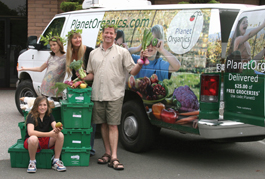home | north bay bohemian index | news | north bay | news article

Photograph by Richard Quinn
Family Passion: Lorene Reed, Larry Bearg and their two daughters form the nexus of Planet Organics.
Planet Organics
East Bay home-delivery firm makes like the tortoise, slow and steady, and wins the race.
By Joy Lanzendorfer
Back in the late 1990s, online food delivery companies were supposed to revolutionize how people got their groceries. All someone had to do was order online and it would be brought to the doorstep, just like milkmen used to dos.
But despite the dotcom venture capital, those companies folded one by one—except for Planet Organics. This year, Planet Organics celebrated its 10th anniversary by moving headquarters to Sonoma, where it leased the old Nicholas Turkey facility, hired more employees and expanded delivery deeper into the North Bay.
"It's the tortoise and the hare story," says Larry Bearg, who co-owns Planet Organics with his wife Lorene Reed. "Those other companies thought they would take over the world in a year. We're a family business, and we've gone about things very slowly. Those other guys had a ton of money and they came and went. We kept putting one foot in front of the other, doing what we could do, and we're still here."
This slow-moving philosophy suits the locally grown, small-scale food that Planet Organics specializes in. On its website, customers can choose from a variety of food boxes starting at $32. They can also choose what food they are getting or let Planet Organics choose the food for them. What they can't control is when their package will be delivered, since routes are scheduled on certain days for certain zip codes. However, the boxes are designed to be left on doorsteps or in garages if someone is not there to receive them.
As much as it can, Planet Organics offers customers local food. In fact, the North Bay's growing organic food market was part of the reason the company relocated here from the East Bay. North Bay farmers they use include Clover Farms, Petaluma Poultry and Wine Country Cuisine.
"The farms were certainly an added attraction," Bearg says. "We knew they were here and we were already buying from some of them. Being up here and close to them is much easier."
By negotiating directly with local farmers and cutting out the middleman, Planet Organics is able to offer food at a reasonable price. Of course, buying local produce can be more difficult in the off-season. Lorene Reed, who handles produce for Planet Organics, sometimes has to go out of state, or even out of the country, to get certain foods.
"I still stay in California as much as possible," she says. "But with bananas and mangos and things like that, I have to go out of the country because people want them. And they are yummy and they should have them."
First and foremost, Reed and Bearg are food aficionados, and Planet Organics is a way for them to share their love of food with other people. They delight in introducing their customers to growers they had never heard of or new foods they have never tried.
Recently, for example, Reed included burdock root in the vegetable box. In the newsletter, she explained what burdock root is, what farm it came from, its nutritional value and recipes for people to try with it.
"Some of the most fun of what I do is introducing people to new food," she says. "Most of the comments and feedback we get from people are things like, 'We would never have tried this if it weren't for you. Thank you for turning us on to this groovy new food.'"
In a time when product recalls are rampant for everything from spinach to pet food, offering people an alternative food source is proving a successful business strategy for Planet Organics. But it started out, well, more organically than that. In 1996, Reed was working as a hairdresser in San Francisco when she learned about Matt's Organics, a small home business a hippie couple was running out of their garage, delivering boxes of organic veggies to 80 Bay Area customers.
At the time, Reed was pregnant with her second child and thinking a lot about the harm pesticides might do to her children. She was also ready to get out of hair styling and trying something new.
"I loved the concept," she says. "You open this box and you get all this groovy stuff inside. So I called the couple up for an interview and ended up buying the company."
By buying almost exclusively from small organic farms, Planet Organics is rejecting the wide-scale corporate food system that stocks most of the grocery stores in the United States.
"There are a lot of problems with our food supply," Bearg says. "And that stems from food being grown on such a huge scale. If one small part of a field becomes contaminated, then it contaminates thousands and thousands of acres of plants."
It took Reed several years to understand the wider impact of the business.
"I was kind of innocent going into this," she laughs. "I wanted to support sustainable agriculture, but when I got into it and learned all about the impact industrial farming is having, I realized—this is serious business, man!"
These days, she's proud to offer a more sustainable food system, one that is full of higher quality food with fewer chemicals. It's a system Reed believes is good for the body and the earth.
"Small farmers work with nature, there's a connection to the earth, with trees and insects," she says. "That's the world I want and that's the world I want my children to grow up in."
|
|
|
|
|
|